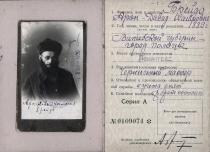This photo was taken in 1941 in Leningrad.
From left to right: Samuil Breido, my uncle, father's brother; German Breido, my uncle, father's brother; Khaim Breido, my paternal grandfather; Aron Breido, my father.
My father's brothers were different by temper. Grandfather Khaim, as well as my father, never thrusted his opinion on anyone; he considered that everyone had to make his own decisions concerning religion, occupation, participation in revolutionary activities and party membership.
That is why grandfather's sons differed from one another: my father was religious and belonged to the Tolstoyans; his brothers did not distinguish themselves by being too religious; at the same time Grigory was a revolutionary and was declared "national enemy";
German was never interested in politics; Isaac was a member of the "Bund" and later an anarchist. However, they all tried to provide education for their children and lived in friendship with each other.
Father's eldest brother, Samuil Yefimovich Breido, started to work at the age of 13 as an assistant at the chemical workshop. At the age of 21 he was enlisted into the Tsarist Army and served at first in St.Petersburg.
Later he participated in the war with Japan, was demobilized and married Vera Rivkina from a wealthy Jewish family [her father owned a factory]. In 1922 they returned to Petrograd. Their younger son Isaac was around 2 years old at that time.
Samuil worked as a carpenter, as a tea agent, later at the chemical workshop with my father, dealing with supplies. Samuil was exiled to Samarqand in 1931 based on Article 59 [economic counter-revolution].
Since he was not considered chief at the workshop, he, unlike my father, was exiled without incapacitation, like the other Breido brothers. He returned in 1934 and died in 1944 in evacuation in Ufa. He educated all his four children.
My father's third brother, German [Yeremey] Yefimovich Breido had a weak health by birth: congenital heart [valvular] defect and bad sight [progressive myopia].
His parents considered that he would not be able to work at the chemical workshop and sent him to Finland to be apprenticed to a tailor.
However, on his return home he never worked as one, but assisted his brothers Aron and Samuil at the workshop. He never showed interest in politics.
He married his cousin Gita Moiseyevna Galyorkina and had two sons: Mark [Mordekhay], born in 1913 and Albert [Aba], born in 1918. In 1931 he was exiled to Voronezh without incapacitation and returned to Leningrad in 1934.
During the war he was in evacuation in Ufa with his family. His children had higher education. German proceeded with the business of his brother Aron, who had died.
German Breido died in 1959, Gita Moiseyevna died in 1982 and they were buried in the Jewish cemetery.






















